Prostate cancer ‘fingerprint’ detected in blood sample
10 March 2020
Scientists at UCL have invented a new test to identify the earliest genetic changes of prostate cancer in blood: a process which could allow doctors to see if cancers have spread, monitor tumour behaviour and enable better treatment selection.

In the study, published in The Journal of Clinical Investigation, researchers at UCL Cancer Institute used Next Generation Sequencing (NGS) to establish if they could identify prostate cancer DNA in blood plasma. Previous studies have focused on tissue samples, however this requires an invasive biopsy.
Researchers say their successful discovery in blood represents a prostate tissue “fingerprint” or early circulating biomarker, and when detected identifies that cancer is active and spreading. As this can be detected in a simple blood test, commonly known as a liquid biopsy, physicians could monitor cancer response to treatment regularly and in real-time.
Moving forward researchers will see if this test could complement or replace the traditional prostate specific antigen test, which is used for prostate cancer diagnosis and treatment monitoring.
Lead author, Dr Anjui Wu (UCL Cancer Institute), said: “Metastatic prostate cancer – the most dangerous late stage of the disease – can vary substantially in its treatment response and clinical progression.
“We urgently need biomarkers that will help us determine how far along each patient’s cancer is, to determine the best course of treatment.
“With tumour biopsies difficult to obtain, being able to identify prostate cancer DNA signatures at the earliest opportunity in blood, will help monitor patients better and assist more effective treatment selection and combination.”
In this proof of concept study, the researchers set out to investigate a process called DNA methylation - that is, a chemical change in DNA molecules that can affect gene function and has been studied in tissues.
To do this, the methylation and genome profiles of circulating-cell free DNA (degraded DNA fragments released to the blood plasma) from 25 metastatic prostate cancer patients were concurrently profiled using NGS. As a control four healthy blood plasma samples were also analysed.
The research group interrogated the molecular profiles to identify a circulating tumour DNA (ctDNA) methylations, which can be used to sensitively track tumour content change.
Traditionally, the amount and quality of circulating cell-free DNA extracted from blood can be limited: surprisingly researchers discovered 1000s of methylation changes specific to the prostate gland in blood samples from men with prostate cancer. Using this finding, they developed these changes into a signature (a blood test that can be used in the clinic) for tracking prostate genetic material in blood to monitor cancer activity.
Corresponding author, Professor Gert Attard (UCL Cancer Institute), said: “We are now testing our new technique in trial patients to see if it can complement or substitute the traditional serum prostate specific antigen (PSA) for diagnosis, risk assignment and monitoring how well a treatment is working.
“We believe the increased sensitivity and additional information we derive, will significantly improve the outcomes of men with advanced prostate cancer.”
Professor Mark Emberton, Dean of the Faculty of Medical Sciences at UCL, said “The field of liquid biopsies has shown great potential recently to improve the diagnosis and management of cancer patients.
“This test could be the first to tell us cancer has got into blood before the spread is large enough to see on imaging. This could allow targeting of treatment for men at the highest risk of prostate cancer spread.”
This research was funded by a Prostate Cancer Foundation Challenge Award, with additional support by Cancer Research UK, and the John Black Charitable Foundation.
Links
- Research paper published in The Journal of Clinical Investigation
- Dr Anjui Wu's academic profile
- Professor Gert Attard's academic profile
- UCL Cancer institute
Image
- 'Prostatic adenocarcinoma with perineural invasion' credit: Nephron on wikimediacommons by CC BY-SA 3.0
Media contact
Henry Killworth
Tel: +44 (0) 207 679 5296
E: h.killworth [at] ucl.ac.uk
 Close
Close

